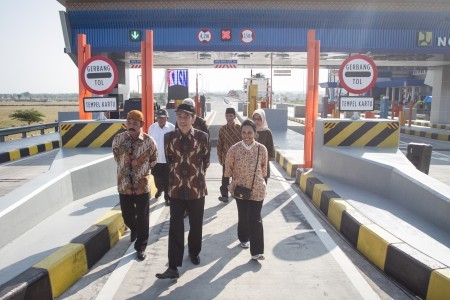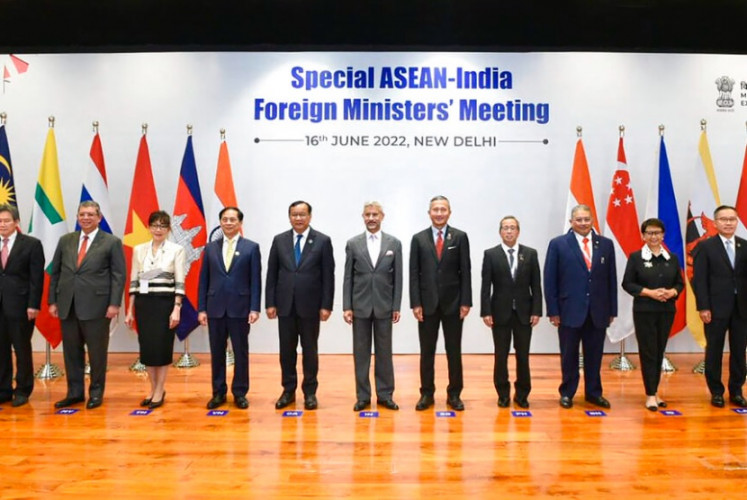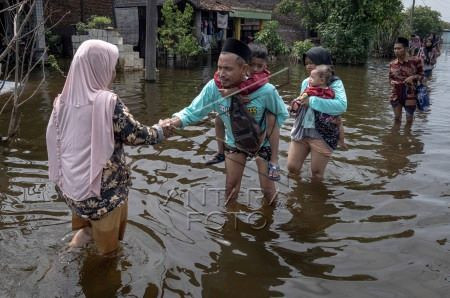Commentary: April 17, 2019 is referendum on Jokowi
Next year, it is really about whether Jokowi has done such a good job in the last five years that he deserves a second term.
Change Size
 President Joko “Jokowi” Widodo (center), accompanied by State-Owned Enterprises Minister Rini Soemarno (right) and Surakarta Mayor FX. Hadi Rudyatmo (left), inspects Ngemplak toll gate in Boyolali regency, Central Java after inaugurating the Kartasura-Sragen toll road on July 15. (Antara/ Mohammad Ayudha)
President Joko “Jokowi” Widodo (center), accompanied by State-Owned Enterprises Minister Rini Soemarno (right) and Surakarta Mayor FX. Hadi Rudyatmo (left), inspects Ngemplak toll gate in Boyolali regency, Central Java after inaugurating the Kartasura-Sragen toll road on July 15. (Antara/ Mohammad Ayudha)
F
orget about the challenger or the two running mates. Ignore the sweet electoral promises either candidate makes. Next year’s election really comes down to the question of whether or not the nation thinks incumbent President Joko “Jokowi” Widodo should continue to lead them from 2019 to 2024.
This may be billed as a rematch of the 2014 election, which was fought fiercely, but in all seriousness, two-time loser Lt. Gen. (ret) Prabowo Subianto is no match for Jokowi, who goes into the race with all the strengths and advantages that an incumbent enjoys.
The hashtag war on social media, which has been going on for months, attests to the central theme of the election, even before a hesitant Prabowo plunged himself into the race on Friday.
The opposition camp has been hard at work promoting the #2019gantipresiden(#2019ChangePresident) campaign, essentially conveying the message that the President had failed and that almost anyone running against the incumbent would be better. That’s the reason why there had been many political figures with minimal presidential credentials, including Amien Rais, who fancied themselves for the nation’s top job, if only they could get a ticket.
The Jokowi camp has responded in kind by aggressively putting out its own #Jokowi2period (#Jokowi2Periods) campaign on social media.
For many voters, April 17, 2019, will not be so much about whether an untested Prabowo would make a better president. That was the theme in 2014 and they voted for Jokowi. Next year, it is really about whether Jokowi has done such a good job in the last five years that he deserves a second term.
Indonesia’s brief experience with direct presidential elections unfortunately sends mixed signals about the performance of an incumbent. Susilo Bambang Yudhoyono got his second term after a landslide victory in 2009. The only other incumbent to run in a post-Soeharto election was Megawati Soekarnoputri, who lost to Yudhoyono in 2004.
In the United States, which like Indonesia is a presidential democracy with a limit of two terms, almost every president since the 1980s got a second chance, such as Ronald Reagan, Bill Clinton, George W. Bush and Barack Obama. The lone exception was George Bush senior. We will know in 2020 if US President Donald Trump defies the trend again.
If voters in April go only by the candidates’ track records, Jokowi’s five years’ experience as president is going to be hard to beat against Prabowo’s zero experience in national government. As someone who was discharged from the Army for questionable conduct, Prabowo is not likely to list his military record as his national experience. That would be campaign suicide.
Both sides will likely focus on looking at Jokowi’s track record from 2014 to 2019, with one side touting the achievements and the other the failures, weaknesses or missed opportunities.
And in all honesty, Jokowi’s presidency has not been disastrous enough to cost him the election.
His populist social policies of making free healthcare services universal, free schooling for 6- to 18-year- olds and his cash subsidy for the poor must have endeared him to the poor and lower class. His decision this year to lower gas prices in spite of soaring world oil prices buys him the lower-middle class voters, the largest and the most politically conscious and thus most decisive segment.
The economy may have grown at a far slower pace than the 7 percent he promised in 2014, but at an annual average growth rate of above 5 percent, it is still decent performance considering the global economic slowdown. Inflation has been kept low and poverty levels are lower.
It is left to the opposition to poke at weaknesses in Jokowi’s policies, and so far they have listed the weak rupiah, the rising trade deficit, the piling government debt and the growing budget deficit. They have also picked on the poor performance of big state companies so much so that some, like oil and gas giant Pertamina, had been asked to sell its assets. They have also pointed at the wide gap between the rich and the poor, although statistics indicate the gap is narrowing, if only slightly.
With the global economy remaining uncertain and impacting Indonesia, the opposition may find more failures and weaknesses in Jokowinomics to attack during the election campaign.
There had been concerns earlier that the opposition would play up sectarian and identity politics against Jokowi, with conservative Muslims mobilizing people at the grassroots to rally behind the #2019gantipresiden campaign. Jokowi’s decision to choose Ma’ruf Amin, the chairman of the Indonesian Ulema Council (MUI) and one of the principals behind the 212 Movement, has essentially deflated the one major threat against his reelection bid. Prabowo, for his part, chose businessman Sandiaga Uno for his running mate rather than top clerics offered to him.
This has essentially left Prabowo with few cards to play.
Hats off to the former general for deciding to run when the odds are heavily stacked against him. There had been suggestions before the formal announcements of nominees on Friday that he should not bother since he stood little chance, or that he should just join the Jokowi camp, which would reduce the election to a one-horse race.
Lose or win, Prabowo is keeping Indonesia’s democracy running into 2019 and beyond.
The old adage “if it ain’t broke, don’t fix it” will likely prevail in an election in which one of them is the incumbent. Prabowo’s task is to prove that it is broken. And Jokowi is out to prove that it ain’t.









